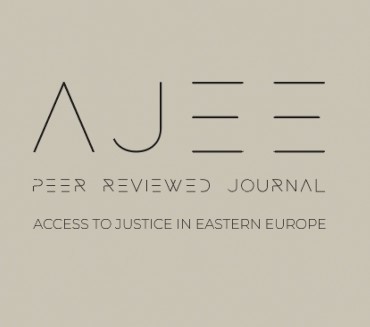1. Introduction. – 2. Research Methodology. – 3. Domain Name. – 3.1. Legal Nature of a Domain Name. – 3.2. Domain Name as an Object of Civil Rights. – 3.3. Domain Name in the ECHR Case Law. – 4. Jurisdictional and Non-Jurisdictional Forms of Enforcement of Rights to Domain Names. – 4.1. General Principles of Enforcement of Rights to a Domain Name. – 4.2. Resolving Domain Name Disputes in Court. – 4.2.1. Domain Name as an Object of Judicial Enforcement. – 4.2.2. Ways to Enforce Rights to Domain Names. – 4.2.3. Respondent in Domain Name Disputes. – 4.3. Enforcement of Rights to Domain Names in the Bodies of the Antimonopoly Committee of Ukraine. – 4.3.1. Unfair Competition and Domain Names. – 4.3.2. Domain Name as Another Commercial Designation. – 4.3.3. The Right to Apply to the Antimonopoly Committee of Ukraine. – 5. Applications of the UDRP Policy. – 5.1. UDRP Policy: General Remarks. – 5.2. Stages of Domain Name Dispute Resolution under the UDRP. – 5.3. Bad Faith Domain Name Registration as a Ground for Satisfaction of a Complaint in a Domain Name Dispute. – 5.4. Domain Name Dispute Resolution in Accordance with the UDRP. – 6. Conclusions.
Background:
Domain name disputes arise concerning the protection of rights to domain names. The legal nature of a domain name as an object remains uncertain, leading to ambiguity in its legal regime. This uncertainty creates challenges in law enforcement and affects the procedures for resolving domain disputes. Ukraine's current civil legislation does not clarify the classification of domain names within the system of civil rights objects. However, the growing role of the digital environment has significantly increased the importance of domain names, contributing to increased disputes over their ownership and use. While the law does not provide for a special procedure for the consideration and resolution of domain name disputes, both judicial and extrajudicial protection procedures are applied, taking into account the peculiarities of the legal nature of domain names. A unique feature of the protection of rights to domain names is the possibility of initiating and resolving a domain name dispute under the UDRP without the involvement of state institutions such as courts or bodies of the Antimonopoly Committee. The absence of proper legal regulation of the domain name as an object and the specifics of domain name dispute resolution has led to ongoing academic discussions on these issues.
Methods:
The article's primary purpose is to investigate the legal nature of domain names and study the procedures for resolving disputes related to them. In this regard, the article first analyses a domain name as an object, defines its legal nature, characterises the position of the ECHR while contributing to the broader scientific discussion on the legal certainty of domain names. The article further analyses the peculiarities of judicial and extrajudicial protection of rights to domain names. It establishes that such protection can be pursued through both jurisdictional (judicial procedure or appeal to the Antimonopoly Committee of Ukraine) and non-jurisdictional forms. The study further describes the procedure for resolving domain name disputes by the court and the Antimonopoly Committee of Ukraine, identifying the main problematic aspects associated with these processes.
Particular attention is given to the scientific analysis of the procedure for resolving domain name disputes by the UDRP. The article outlines the main stages of domain name dispute resolution under the UDRP and explains the content and peculiarities of bad faith domain name registration, which often serves as the basis for disputes. Subsequently, the author formulates conclusions on improving the legal regime of a domain name, as well as on the procedure for resolving domain disputes.
Results and conclusions:
Domain disputes are a common category of cases resolved both in and out of court. The author considers that difficulties in resolving domain disputes are caused by the legal uncertainty of a domain name as an object of civil rights. Currently, the legal nature and legal regime of domain names are not defined in the law. There is no special law governing domain names, and while the Civil Code of Ukraine and other legislative acts mention them, they do not comprehensively regulate the rights associated with them.
The study proves that, in this regard, domain name rights are protected through other objects reflected in a domain name, such as trademarks, commercial names, geographical indications, copyrighted objects, and names of individuals. The author substantiates that a domain name is an independent object that may be subject to sui generis law and which grants domain name owners (in particular, registrants) special property rights to use a website (administration, use, etc.); these rights can be transferred (for a fee or free of charge) and can be waived. The author further establishes that domain name disputes may be resolved in or out of court. It is considered that the practice of resolving domain disputes under the UDRP is widespread.
At the same time, its drawback, which should be addressed, is that it applies only to disputes involving trademarks reflected in domain names. The approach to resolving such a dispute is based solely on proving the unfair nature of the domain name registration. It is substantiated that these circumstances significantly narrow the possibilities for applying the UDRP in resolving domain name disputes. To address this limitation, the author proposes supplementing the Law on Marks to include a special method of protection: granting trademark certificate holders the right to demand the re-delegation of a domain name as an additional method of protection.

